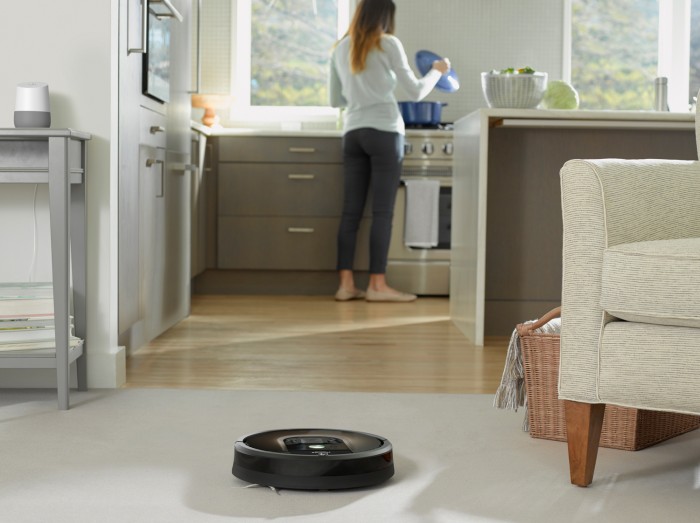Your Roomba Is Also Gathering Data about the Layout of Your Home

If you’re a cute little robotic vacuum, there’s good reason to have a map of the inside of someone’s home. You can be more efficient when tidying up people’s floors, navigate more easily to and from your charging station, and even pick up where you left off if you had to stop vacuuming before you ran out of juice.
Unfortunately, none of those reasons explain why iRobot, the maker of the Roomba, the most popular robo-vac, might take that map data and give it to third parties. And yet that’s what’s been reported widely following an interview by Reuters with the company’s CEO, Colin Angle (Update: the Reuters article was amended after iRobot issued a statement saying its map data would be given away for free to some companies. This article has been updated accordingly).
Here’s the key quote: “There’s an entire ecosystem of things and services that the smart home can deliver once you have a rich map of the home that the user has allowed to be shared,” Angle said. He also told said that iRobot could reach a deal with Amazon, Alphabet, or Apple within the next couple of years to share their maps of users’ homes.
This would, obviously, be a large pivot for a company that first made its money selling reconnaissance and bomb-defusing robots to the military before becoming one of the bigger success stories in consumer robotics.
But it's data that Amazon and others are likely to want badly. All three of the companies mentioned above have smart speaker products (iRobot added support for Amazon’s voice recognition AI, Alexa, back in March), and the Reuters item suggests that being able to see the layout of someone’s home would allow a company to tune its audio settings to get the best possible acoustics.
But let’s be real: the biggest opportunity has to lie with Amazon. The company sells almost every consumer good you can imagine, and its business is all about tailoring product suggestions to consumers’ buying habits. Well, what if Amazon could call up a recently created map of your house and suggest more items for purchase?
It’s important to note that the kind of “rich map” Angle describes isn’t created by every single Roomba sold since 2002, when the device hit the market. It’s only the newer and higher-end models that have added a camera to the basic package of short-range infrared and laser sensors. “Maybe that doesn’t unnerve you,” Gizmodo notes in its coverage, which also includes a dive into iRobot’s terms of service, “but it probably should.”
Angle told Reuters that iRobot would not give out the mapping data it collects without customers’ permission, which is good. That indicates that if and when this starts happening, there will be a notice to users, and that they’ll have a clear chance to refuse consent (though Angle expressed confidence that people would agree).
Let us hope so. As Gizmodo's piece notes, the company's terms of service make it look like iRobot already has broad permissions to do what it likes with any data it collects. That would violate one of the central tenets of modern surveillance capitalism. Facebook, Google, and others have a at least a reasonable argument for why they suck up your data and use it to tell advertisers and other third parties all sorts of revealing information. Simply put: their services are free to use, and your data is the payment they extract.
With iRobot, that’s not the case. People are buying gadgets that at the high end cost nearly $1,000, expecting that they are taking ownership of a deluxe piece of hardware—not inviting a robotic spy into their living rooms.
Read more: Reuters, Gizmodo, "Google Now Tracks Your Credit Card Purchases and Connects Them to Its Online Profile of You")
Keep Reading
Most Popular
How scientists traced a mysterious covid case back to six toilets
When wastewater surveillance turns into a hunt for a single infected individual, the ethics get tricky.
The problem with plug-in hybrids? Their drivers.
Plug-in hybrids are often sold as a transition to EVs, but new data from Europe shows we’re still underestimating the emissions they produce.
Sam Altman says helpful agents are poised to become AI’s killer function
Open AI’s CEO says we won’t need new hardware or lots more training data to get there.
Stay connected
Get the latest updates from
MIT Technology Review
Discover special offers, top stories, upcoming events, and more.